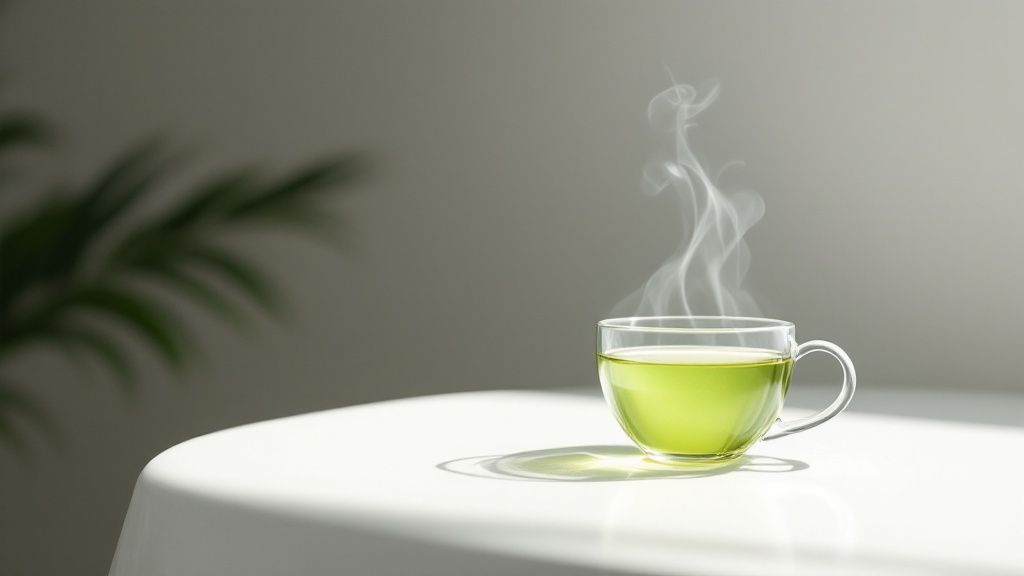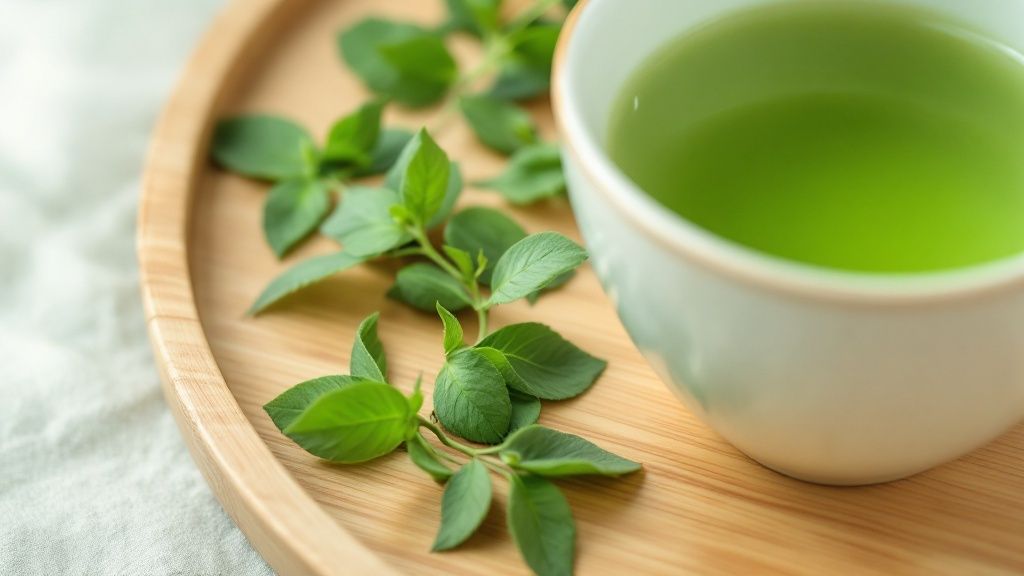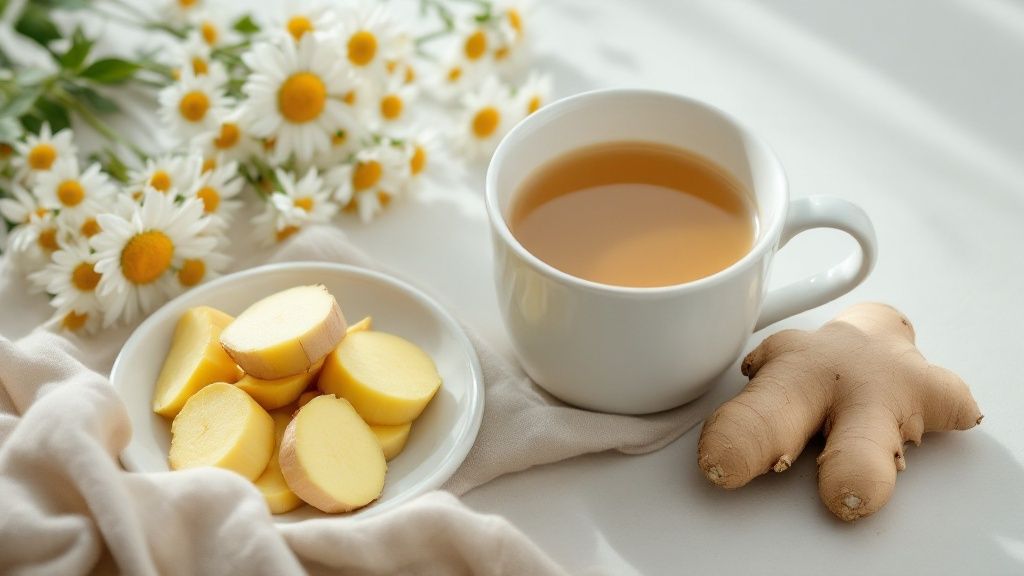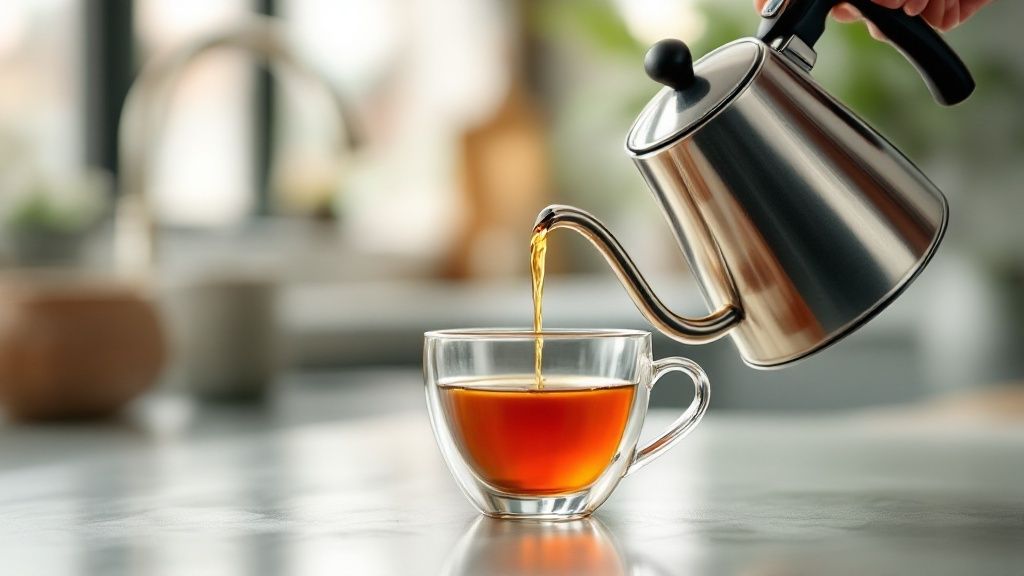Right then, let's get one thing straight. Can a simple cuppa really help you shift a few pounds?
The answer is yes, but it’s not quite the magic bullet some people make it out to be. Think of a good brew as a trusty sidekick in your weight loss journey, not the hero. It works alongside a balanced diet and a bit of regular movement, giving your body a gentle, natural nudge in the right direction.
Can You Really Sip Your Way to Weight Loss?

So, what's the real story here? While it won't miraculously melt away the kilos, certain teas can genuinely support your efforts.
The secret lies in the natural compounds hiding in the tea leaves. We’re talking mainly about catechins (the star player being EGCG) and good old caffeine. This dynamic duo works together to give your metabolism a bit of a boost, helping your body get a little more efficient at burning fat.
It’s not about some mythical ‘detox’ nonsense. Instead, it’s about making a warm, satisfying cup of tea a regular part of your routine—a sustainable habit that supports the hard work you're already putting in.
Finding Tea's Place in a Healthy Lifestyle
To really get the benefit, it's all about realistic expectations. Drinking tea on its own won't do much. Its true power is unlocked when it’s part of a bigger picture.
- A Nudge for Your Metabolism: Those natural compounds can slightly increase the number of calories your body burns throughout the day.
- A Smarter Way to Hydrate: Switching out sugary juices or fizzy drinks for a proper brew cuts down on empty calories while keeping you hydrated.
- Keeping Cravings at Bay: Sometimes, all you need is a warm, comforting drink to tide you over. A cup of tea is a brilliant, low-calorie way to manage those in-between-meal urges.
It's simple, really. Tea doesn't replace healthy habits, it enhances them. It works with your body, supporting the positive changes you're already making with your food and exercise.
And it’s not just talk. Research from big UK studies, like the UK Biobank, has found a real, albeit small, connection between drinking tea and a lower risk of obesity. In fact, regular tea drinkers saw a 0.2% decreased risk of obesity, which just goes to show it can be a valuable part of a healthier lifestyle.
Of course, a good brew is just one piece of the puzzle. Looking at what you eat is just as crucial. For instance, understanding the role of high protein snacks for weight loss can make a massive difference. When you combine smart choices like these, you're building a much stronger, more sustainable plan to reach your goals.
Exploring the Top Teas for Weight Management

When you're looking for a tea to support your weight loss goals, it's easy to feel a bit lost. The truth is, not all brews are created equal. While most teas are good for you, a few stand out from the crowd, packed with specific compounds that genuinely support your metabolism and help with fat oxidation.
Let’s dive into the champions of the tea world, each with its own unique personality and way of working. Understanding what makes them different will help you find the perfect partner for your health journey. It’s fascinating to think that while they all come from the Camellia sinensis plant, the way they're processed changes everything. If you're curious about this, you can learn more in our guide to the main types of tea.
Green Tea: The Metabolism Booster
Green tea is the undisputed celebrity of weight-loss teas, and for good reason. It’s absolutely bursting with potent antioxidants called catechins. The real star of the show is Epigallocatechin gallate (EGCG), which works beautifully with the tea's natural caffeine to give your metabolism a gentle but noticeable nudge.
Think of your metabolism as a furnace. The EGCG and caffeine act like a pair of bellows, stoking the flames to help you burn calories more efficiently, even when you're just sitting at your desk. This process, known as thermogenesis, means your body is simply using up more energy throughout the day.
Research consistently backs this up. A comprehensive review, which included UK-based trials, found that people who drank green tea regularly lost an average of 1.23 kg more than non-drinkers over a 10-week period. It’s not a magic bullet, but it’s a tangible helping hand.
Oolong Tea: The Fat Mobiliser
Oolong is the fascinating middle ground between green and black tea, and it boasts a unique blend of benefits from both. It's particularly celebrated for its knack for improving fat metabolism. The special polyphenols in oolong tea help activate enzymes that are tasked with breaking down triglycerides – that's the fat stored in your fat cells.
Put simply, oolong tea helps your body get better at raiding its own fat stores for energy. This makes it a brilliant choice for a pre-workout cuppa, as it could help you burn a little more fat during your exercise session.
Black Tea: The Gut Health Ally
As the most oxidised of the teas, black tea develops a completely different set of powerful compounds called flavones. It might have fewer catechins than its green cousin, but it offers a different, equally clever route to supporting weight management.
The large polyphenol molecules in black tea are too big to be absorbed early on in your digestion. Instead, they travel down to the large intestine where they can:
- Promote good gut bacteria: A happy, healthy gut microbiome is increasingly being linked to better weight control and lower inflammation.
- Influence energy metabolism: These compounds encourage the growth of beneficial bacteria that positively affect how your body stores and uses energy.
Pu-erh Tea: The Fermented Wonder
Hailing from China's Yunnan province, Pu-erh is a fermented tea with a deep, earthy flavour and a fast-growing reputation. The fermentation process creates unique compounds you won't find in any other tea.
Studies suggest Pu-erh can help inhibit enzymes involved in creating fat, basically making it harder for your body to synthesise and store new fat from the food you eat. It may also help reduce belly fat and lower blood lipid levels, making it a sophisticated and powerful choice for anyone on a health journey.
A Quick Look at Weight Loss Teas
To make things a bit clearer, here’s a simple breakdown of how these fantastic teas stack up against each other. Each one brings something unique to the table.
| Tea Type | Key Compound | Primary Benefit | Flavour Profile |
|---|---|---|---|
| Green Tea | Catechins (EGCG) | Boosts metabolism (thermogenesis) | Grassy, vegetal, sometimes nutty |
| Oolong Tea | Polyphenols | Enhances fat breakdown and mobilisation | Floral, fruity, toasty, or woody |
| Black Tea | Flavones | Supports gut health and microbiome | Malty, brisk, robust, sometimes sweet |
| Pu-erh Tea | Unique Polyphenols | Inhibits fat synthesis and storage | Deep, earthy, smooth, and rich |
Ultimately, the best tea is one you genuinely enjoy drinking. Whether you're drawn to the fresh taste of green tea or the complex notes of a good Pu-erh, incorporating any of these brews into your daily routine is a delicious way to support your well-being.
How to Brew for Maximum Health Benefits

So, you’ve picked out the perfect tea to help with your weight loss goals. Brilliant. But the journey from leaf to cup is just as important as the tea itself. How you brew it can make or break its effectiveness.
Think of it like cooking vegetables – if you boil them into mush, you lose all the good stuff. It's exactly the same with tea. To really get the most out of every cup, you need to coax out all those beneficial compounds, like catechins, without accidentally destroying them.
It all boils down to two key things: water temperature and steeping time. Get these right, and you'll unlock a brew that’s not just more flavourful, but far more potent. You’re turning a simple cuppa into a proper wellness tool.
Mastering Water Temperature and Steeping Time
One of the most common mistakes is pouring roaring, boiling water straight from the kettle onto delicate tea leaves, especially green tea. It’s like using a blowtorch when a gentle warmth is all that’s needed. That intense heat literally scorches the leaves, killing off the precious catechins (like EGCG) and leaving you with a bitter, disappointing taste.
A little bit of patience goes a long way. Let the water cool for just a moment, and it makes all the difference.
- Green Tea: This one is the most delicate. You want the water to be around 80°C. A simple trick is to let a boiled kettle sit for about two minutes with the lid off before you pour. Brew it for a short and sweet 1-3 minutes.
- Oolong and Black Tea: These are a bit tougher and can handle the heat. Use water that's just off the boil, somewhere around 90-95°C. A longer steep of 3-5 minutes will draw out their full-bodied flavour and those beneficial flavones.
Proper brewing isn't just about taste; it's about preservation. By using the right water temperature, you’re protecting the very compounds that support your metabolism and fat-burning goals.
If you want to really get into the nitty-gritty of the perfect brew, our guide explains more about how long you are supposed to brew tea. It’s a fantastic read for any tea lover.
Loose Leaf vs Tea Bags
While there’s no denying the convenience of a tea bag, loose-leaf tea is almost always the better choice when you’re aiming for maximum health benefits. It really just comes down to quality and space.
Tea bags are often filled with ‘dust’ and ‘fannings’ – the tiny, broken bits left over from processing. This dust can release more tannins when it hits hot water, which is a big reason why bagged tea can sometimes taste so bitter.
Loose-leaf tea, on the other hand, uses whole or much larger pieces of leaves. When you add hot water, they have room to properly unfurl and expand, releasing their full spectrum of catechins, antioxidants, and essential oils. The result is a cup that's not only richer in flavour but also much more potent in all the good stuff that supports your weight management journey. A tea bag is quick, but loose-leaf is an investment in quality and effectiveness.
Building a Sustainable Tea Habit for Success

Knowing your oolong from your peppermint is a brilliant start, but the real magic happens when sipping tea becomes second nature. Lasting results don't come from a week of intense effort; they're built on small, enjoyable habits that stick.
The goal is to weave tea into your daily life so seamlessly that it feels like a comforting ritual, not a chore. It’s about being smart with your cuppa, turning a simple brew into a powerful tool that helps you reach your bigger health goals. This way, you’re creating a little support system for yourself, one mug at a time.
Finding Your Perfect Tea Timing
Believe it or not, when you drink your tea can make a huge difference. Think of it as scheduling your secret weapon. Timing your cups can help you sidestep cravings, give you a lift when you need it, and even encourage your body’s natural fat-burning processes.
Here are a few moments to make the most of your brew:
- Your Pre-Workout Boost: A cup of green or oolong tea about 30-40 minutes before you exercise can be a game-changer. The natural caffeine and catechins work together to potentially increase fat oxidation, which means you might just burn more fat for fuel during your workout.
- The Afternoon Pick-Me-Up: When that 3 p.m. slump hits, it’s all too easy to reach for a sugary biscuit. A flavourful cup of black tea can give you that gentle energy lift you're after and satisfy cravings, all without the empty calories.
- The Evening Wind-Down: A warm, caffeine-free herbal tea like peppermint or rooibos after dinner is a wonderful way to signal that the kitchen is closed for the night. It's a comforting ritual that helps stop mindless grazing in front of the telly.
The trick is to swap out a less-than-ideal habit for a positive one. Instead of a high-calorie latte or a fizzy drink, you're choosing something that actively supports your tea for weight loss goals.
For the best results, let your tea habit become part of a wider holistic wellness approach, one that looks after your overall health for good.
How Much Tea Should You Drink?
When it comes to tea, consistency trumps quantity, but there seems to be a sweet spot. Research suggests that drinking around four to five cups a day is ideal for getting the full metabolic and cardiovascular benefits.
Interestingly, a report from the UK Tea Advisory Panel found that over 85% of British adults are missing this target, even though tea is the nation's favourite drink.
To hit that goal without it feeling like a task, why not brew a big jug of iced tea to keep in the fridge? You could also keep things interesting by adding a slice of lemon, a sprig of mint, or a bit of fresh ginger to your cup. Building this simple, lasting ritual is your best strategy for success.
Common Mistakes That Can Derail Your Progress
Making tea a part of your daily ritual is a fantastic move for managing your weight, but a few simple missteps can easily undo all that good work. It’s a shame to see your efforts go to waste because of a few common mistakes.
Think of it this way: the natural goodness in the tea leaves is piling up on the positive side of a scale. But a couple of poor choices can quickly tip the balance the other way. Knowing what to watch out for is the key to making sure every single cup is working with you, not against you.
Dodging the ‘Detox Tea’ Myth
One of the biggest traps out there is the allure of heavily marketed ‘slimming’ or ‘detox teas’. They often make grand promises of rapid weight loss, but the reality is usually something else entirely—and not very healthy. These products are often packed with powerful, sometimes undisclosed, laxatives like senna. These don't burn fat.
What they actually do is force your body to lose water, which can lead to dehydration, disrupt your electrolyte balance, and cause some pretty serious digestive upset.
The Bottom Line: True, lasting weight loss is about reducing body fat, not just shedding water weight from laxatives. Always stick with pure, natural teas like green, black, or oolong from a source you trust to give your body the right kind of support.
Many people just aren't aware of the risks that come with these so-called miracle products. If you're after a much safer approach, it helps to understand how to do a gentle cleanse the right way. We've written about detox in moderation before.
Resisting the Urge to Add Calories
The second big mistake is what you put in your cup. It’s such a simple habit, but it can completely sabotage your progress. A plain cup of green tea has next to no calories, but the moment you add sugar, honey, or milk, that all changes.
Think about it: just two teaspoons of sugar in three cups of tea a day adds up to an extra 420 calories a week. Over a year, that’s enough to contribute to several pounds of weight gain, wiping out the gentle metabolic lift the tea was giving you in the first place.
To make sure your tea stays a true partner on your tea for weight loss journey, try some of these instead:
- A slice of lemon or lime: Adds a bright, zesty flavour with barely any calories.
- A sprig of fresh mint: Gives a wonderfully refreshing, clean taste.
- A thin slice of ginger: Provides a lovely, warming, spicy kick.
- A dash of cinnamon: Can help curb a sweet craving without any sugar.
At the end of the day, it's about remembering that tea is a brilliant addition to a healthy lifestyle, not a magic replacement for one. By sidestepping these common slip-ups, you can ensure your daily brew remains a powerful, positive part of your wellness routine.
Your Top Questions on Tea and Weight Loss Answered
Even with all the science, you might still have a few questions rattling around. That’s completely normal. Let’s clear up some of the most common queries we get about using tea for weight loss.
How Much Weight Can I Realistically Lose by Drinking Tea?
This is the big one, isn't it? It’s vital to be realistic here. Think of tea as a helpful supporting act, not the headline star.
While some studies hint at a modest potential loss—maybe around 1-2 kilograms over several weeks—that’s far from a guarantee. Real, lasting results come from a balanced diet and regular movement. Tea’s real job is to give your metabolism a gentle nudge, keep you hydrated, and fend off cravings for sugary drinks. It works best as part of a bigger, healthier lifestyle change.
Can I Drink Tea for Weight Loss if I Am Sensitive to Caffeine?
Absolutely. While the caffeine in green or black tea certainly plays a part in that metabolic boost, it’s not the only game in town. The catechins, especially EGCG, are still there and working their magic.
You have a couple of brilliant options:
- Decaffeinated Teas: Go for a decaffeinated green or black tea. The decaffeination process might reduce the catechin content slightly, but plenty remains, so you'll still get a lot of the benefits.
- Herbal Infusions: Naturally caffeine-free brews like rooibos or peppermint are fantastic choices. They won't boost your metabolism in the same way as teas from the Camellia sinensis plant, but they are masters at keeping you hydrated and satisfying that desire for a flavourful drink, which is a huge help.
The most important thing is finding a brew you enjoy and will actually stick with. Whether it has caffeine or not, swapping a high-calorie drink for a cup of tea is always a win.
Does Adding Milk or Sugar Cancel Out the Benefits?
In a word, yes. This is one of the easiest ways to undo all your good work. A plain cup of tea has virtually no calories, but as soon as you add milk and sugar, it can become a high-calorie affair.
Just two teaspoons of sugar and a splash of milk in a few cups throughout the day can easily add up to hundreds of extra calories each week. That’s more than enough to wipe out the small metabolic advantage the tea gives you. For the best results, try to enjoy your tea black. If it tastes too bitter, you might be brewing it for too long. If you still need a little something extra, a slice of lemon or a sprig of mint is a far better choice.
What’s the Difference Between 'Weight Loss Tea' and Regular Tea?
This is a crucial distinction. Regular teas—like green, black, oolong, and Pu-erh—are simply the dried leaves of the Camellia sinensis plant. Their health benefits are completely natural, coming from the compounds found inside the leaves themselves.
"Weight loss teas" or "slimming teas," on the other hand, are often just marketing terms for blended products. These often contain powerful herbal laxatives like senna, which can cause dehydration and serious digestive upset. They only lead to a temporary loss of water weight, not a reduction in body fat. For safe, sustainable support, always stick with pure, natural teas.
At Jeeves & Jericho, we believe in the pure, natural power of high-quality tea. Explore our exceptional collection of whole-leaf teas, from metabolism-boosting green teas to rich, satisfying black teas, all ethically sourced for the perfect cup. Start your journey today at https://www.jeevesandjericho.com.


